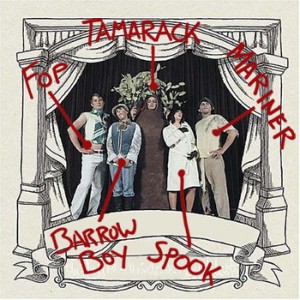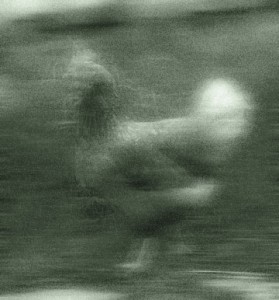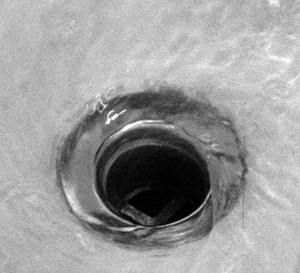The Annotated Decemberists No. 9: “July, July!”
 Perhaps no band’s lyrics better lend themselves to pseudo-academic analysis than those of The Decemberists. The Annotated Decemberists is an attempt to puzzle through the Portland, Oregon, group’s entire catalog song by song—examining all the obscure vocabulary, historical references and poetic subtext—or go crazy trying.
Perhaps no band’s lyrics better lend themselves to pseudo-academic analysis than those of The Decemberists. The Annotated Decemberists is an attempt to puzzle through the Portland, Oregon, group’s entire catalog song by song—examining all the obscure vocabulary, historical references and poetic subtext—or go crazy trying.
Though the source of this information is somewhat sketchy, there are a couple of websites that claim this song was inspired by a former slaughterhouse in Portland in which Decemberists singer-songwriter Colin Meloy squatted one summer. And I’m willing to give them the benefit of the doubt, because it makes as much sense as any other interpretation.
This is as good an example of classic Meloy lyrics as you’re likely to find: A title that’s somehow reminiscent of a 19th-century revolutionary rallying cry? Check. Random reference to an unusual ethnic subgroup? Check. Undergarments and ghosts? Check and check.
“July, July!”
from Castaways and Cutouts, 2002
There is a road that meets the road
That goes to my house
And how the green grows[1] there
And we’ve got special boots
To beat the path[2] to my house
And it’s careful, and it’s careful when I’m there

And I say your uncle was a crooked French Canadian
And he was gut-shot running gin[3]
And how his guts were all suspended in his fingers[4]
And how he held ‘em
How he held ‘em, held ‘em in
And the water rolls down the drain[5]
The water rolls down the drain
O, what a lonely thing
In a lonely drain
July, July, July
It never seemed so strange
This is the story of the road that goes to my house
And what ghosts there do remain
And all the troughs that run the length and breadth of my house[6]
And the chickens how they rattle chicken chains[7]
And we’ll remember this when we are old and ancient
Though the specifics might be vague
And I’ll say your camisole[8] was a sprightly light magenta
When in fact it was a nappy[9] bluish grey

And the water rolls down the drain
The blood rolls down the drain[10]
O, what a lonely thing
In a blood red drain
July, July, July
It never seemed so strange
- This is a rather conspicuous phrase. It is a little reminiscent of the English folk song “Green Grow the Rushes, O,” which follows the same cumulative structure as “The 12 Days of Christmas.” Wikipedia thinks the song’s title might come from an attempt to Anglicize a line of Gaelic, and also offers this choice bit of risque interpretation: “Given how folksongs tend to be hearty about fertility, the reference to fast-growing rushes may be a jesting allusion to male arousal – a common theme in song and comedy until the late Empire age.”↑
- Are there special boots for trailblazing? Like different from regular hiking boots? Two minutes of Google searching proved inconclusive.↑
- “Rum-running” was the term for smuggling liquor by boat. Per Wikipedia, the bootleggers who started out sneaking rum from the Bahamas into the United States during Prohibition soon moved on to more profitable commodities such as English gin. It’s easy to imagine Quebecois gangsters getting in on that action and bringing shipments down from Canada. At least I can imagine it.↑
- A commenter at songmeanings.com writes that this phrase reminds him or her of the passage from Catcher in the Rye, in which Holden imagines that elevator operator and part-time pimp Maurice has shot him in the gut: “What I’d do, I’d walk down a few floors – holding onto my guts, blood leaking all over the place – and then I’d ring the elevator bell. As soon as old Maurice opened the doors, he’d see me with the automatic in my hand and he’d start screaming at me, in this very high-pitched, yellow-belly voice, to leave him alone. But I’d plug him anyway.” Personally, it always reminded me of Catch-22 and (SPOILER ALERT, I suppose) the final flashback to the damaged bomber, in which it is finally revealed what happened to Snowden. Jeez, what is it with great mid-20th-century literature with the word “catch” in the title and guts-spilling-out imagery, anyway?↑
- You’ve surely heard that water always circles the drain counterclockwise in the northern hemisphere. Unfortunately, it’s a myth. Its origins lie in the Coriolis force, a scientific phenomenon that explains why hurricanes always rotate counterclockwise in the northern hemisphere. The force is caused by the way that the earth’s rotation results in objects at different points on its surface traveling at different apparent speeds based on their latitude—and, frankly, the difference in latitude between one side of your bathtub and the other isn’t great enough to cause any appreciable Coriolis effect. Rather, it depends on the structure of the drain and how the water is introduced to it. Sorry to burst your bath bubble.↑
- Ah, at last we arrive at the allusion to the slaughterhouse mentioned in the intro. Those websites attribute the following quote to Meloy regarding the grisly history of his summer residence:”On the third floor there were troughs along the side… down the hallways where the blood would run. And then the troughs would actually lead to the outside, where it would pour off the side of the building, I swear to God. So we assume that the house — that the building was haunted by dead chickens.”↑
- Speaking of chicken ghosts, this blog—which is at least as trustworthy as sources citing that quote from Meloy—claims that there is a spot in London that is haunted by the chicken that Francis Bacon was trying to freeze for future consumption when he contracted a fatal case of pneumonia.↑
- “n. 1 a woman’s sleeveless, often lace-trimmed undergarment for the upper body, worn as under a sheer blouse 2 a woman’s short negligee.” Skivvies of yore are a recurring theme in Meloy’s lyrics, as we shall see.↑
- “adj. 1 covered with nap; hairy, downy, shaggy, etc. 2 KINKY (sense 1): said esp. of the hair of blacks and used derogatorily or contemptuously.” We’ll assume that Meloy is not following the lead of Don Imus and is utilizing the first sense of the word to describe some fabric.↑
- This is obviously a callback to the previous slaughterhouse allusion, but it also can’t help but conjure up the most famous murder scene in cinema history.↑